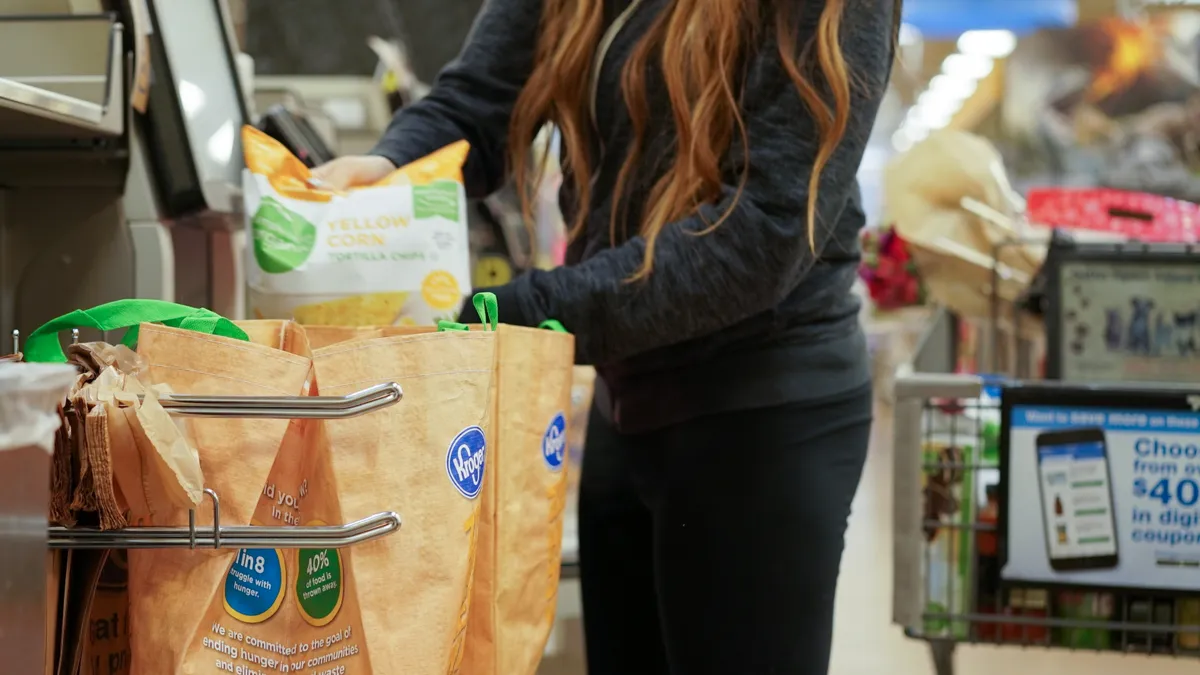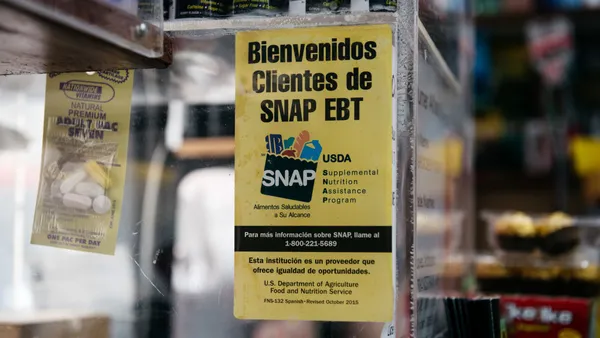Dive Brief:
- Kroger's fiscal fourth-quarter net income dropped $259 million from $854 million a year prior, the retailer noted in its earnings report. Earnings per share of 48 cents and net sales of $28.1 billion missed analyst expectations. Revenue fell 9.5% from the previous year. Shares were down 10% in pre-market trading on Thursday.
- The company reported adjusted net earnings of $1.7 billion, which were ahead of internal forecasts. This was mostly due to the retailer's positive execution of its Restock Kroger initiative. The retailer's digital sales grew 58%, and it achieved more than $1 billion in cost savings.
- Adjusted gross margin decreased by 93 basis points over the year-ago period, which the company mostly attributes to changes in sales mix, price investments and supply chain expenditures, including warehouse start-up costs. Looking ahead to fiscal 2019, the company is targeting identical sales growth, excluding fuel, to 2% to 2.25%. Kroger expects net earnings to be between $2.15 to $2.25 per diluted share, higher than analyst expectations of $2.16 per share.
Dive Insight:
Kroger has asked investors to view it as a growth company rather than just a grocer, but its stock price plunge this morning once again showed Wall Street's skepticism that the grocer will get a return on steep investments as it fights for consumer dollars.
Kroger's gross margin drop of 93 basis points was a focus point for analysts who participated in the company's earnings call Thursday morning. In a question-and-answer session with executives, analysts expressed doubt about the grocer's improved forecast for 2019, including achieving an operating profit of around $3 billion.
Chief Financial Officer Michael Schlotman noted that the margin decline in Q4 reflected warehouse start-up costs that will not be a factor in 2019. He and other company executives, including CEO Rodney McMullen and Kroger Personal Finance CEO Gary Millerchip, said they expect the core grocery business to improve over the course of 2019 and for alternative investments to gain further traction.
During this latest quarter, and across 2018 as a whole, Kroger made significant investments in its transformation. Investments in e-commerce, which weighed on the bottom line in 2018, are expected to become a "tailwind" this year, McMullen said. Spending on store optimization was also "more disruptive" last year than it will be this year, Schlotman noted.
"Landing the first year of a three-year plan is always the most difficult," said Schlotman, who will retire later this year, with Millerchip stepping into his role.
All of these initiatives fall under the retailer's Kroger Restock plan to move beyond the traditional margin-starved grocery business. This includes investments in what McMullen calls "margin-rich, asset-light" business opportunities ranging from branded credit cards to licensing its store technology to other retailers. It also includes spending on new channels and product categories. Since Q4 2017, Kroger has spent $247 million to partner with British e-grocer Ocado and acquired meal kit company Home Chef in May for $200 million.
Kroger's private label business, which crossed the 30% market share threshold this latest quarter, is a bright spot that the grocer is putting significant marketing muscle behind. Simple Truth, now a $2.3 billion brand, continues to expand and now gets promoted through special store displays.
News that Amazon plans to build a new chain of grocery stores likely won't relieve investors' anxiety anytime soon. But Kroger is doing what it needs to do to improve its business over the long term, said Mickey Chadha, vice president of investment firm Moody's.
"Kroger's fourth-quarter earnings and 2019 guidance demonstrate that the company continues to execute its Restock Kroger plan, which will continue to pressure margins in the near to medium term as it makes the necessary investments for future growth," Chadha wrote in comments emailed to Grocery Dive.














